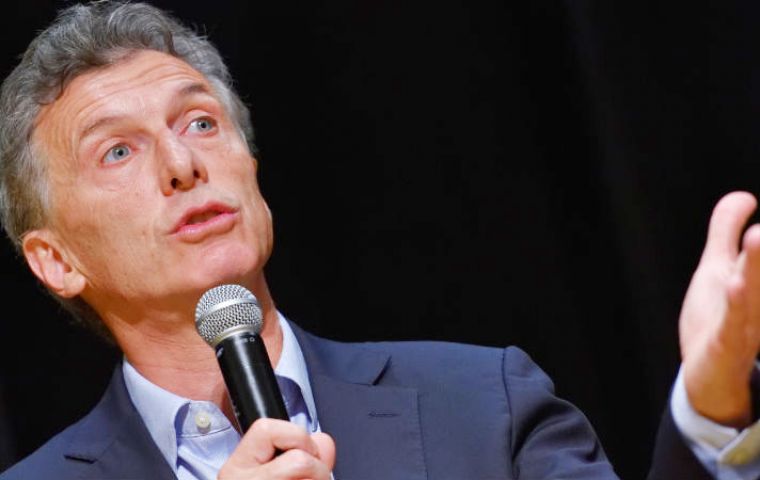MercoPress. South Atlantic News Agency
Macri manages to neutralize labor unrest with accord on income tax floor
 Macri needs to improve the fiscal situation inherited from the profligate Kirchner years and clashed with the opposition and unions on the income tax floor
Macri needs to improve the fiscal situation inherited from the profligate Kirchner years and clashed with the opposition and unions on the income tax floor The Argentine government managed on Monday a great breathing space after reaching an understanding with labor unions on income tax cuts which threatened to derail relations with organized labor, and now also ensure a peaceful end of the year holidays. During the morning and while negotiations were ongoing, transport unions showed their muscle paralyzing flights, trains, buses and subways, in the main cities of the country.
President Mauricio Macri needs to improve the fiscal and inflation situation inherited from the profligate Kirchner years and clashed with the opposition and unions on the income tax floor, a subsidiary bill from the annual budget. During the Kirchner years and with rampant inflation, the government always had the income tax floor low and running behind price increases which meant the fiscal net kept catching a growing number of fixed earnings, a situation strongly criticized by labor and the opposition, which then included Macri.
With inflation in a decreasing tendency, but still in the range of 40% in the last twelve months, Macri's original income tax floor proposition triggered a strong reaction both in Congress, where his precarious coalition dispersed and the unions started with specific strikes to show their strength.
Critics in the Lower House managed to dilute and lower Macri's original proposal which led to a serious exchange of “fiscal irresponsibility” claims between the Executive and members of congress normally aligned with government. However when the bill was to begin to be considered at Senate level, and after long standing negotiations with congress, provincial governors and unions, an understanding was struck on Monday.
The understanding with the unions now has to be considered in Congress, and approved before the end of the year. However although there is still room for dissent and last minute surprises, the understanding should be voted into law, hopefully neutralizing restless labor and containing any end-of-the-year lootings to supermarkets and businesses as has happened in previous years in Argentina.
Macri, who marked one year in office on December 10, has launched sweeping reforms to balance the budget. But he faces growing resistance amid a recession and high inflation. Seven in 10 Argentines are worried about the economy, and a growing number think Macri has failed to deliver on his campaign pledges, according to a recent poll.




Top Comments
Disclaimer & comment rules-

Read all commentsInteresting story.
Dec 21st, 2016 - 07:25 pm 0“Macri manages to neutralize unrest.”
What really happened is, Macri backtracked on plans to significantly increase the number of those paying income tax, and a mid-way agreement was reached--after the transport union stopped work early morning.
“During the Kirchner years and with rampant inflation...”
During the last year of CFK government it was just over 20 per cent.
How's Macri been doing during his first year of presidency?
“With inflation in a decreasing tendency, but still in the range of 40%...”
What about fiscal prudence?
“Macri...has launched sweeping reforms to balance the budget.”
Not at all. Macri is just keeping the expenses high--hence the deficit--and unlike the CFK government, is ballooning Argentina's foreign debt at record speeds.
And what's the result?
“Seven in 10 Argentines are worried about the economy, and a growing number think Macri has failed to deliver on his campaign pledges...”
Merry Christmas everybody.
Commenting for this story is now closed.
If you have a Facebook account, become a fan and comment on our Facebook Page!